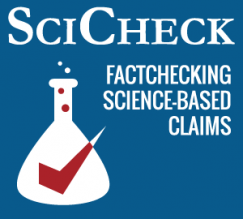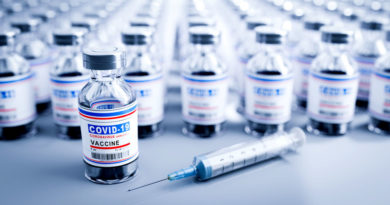Researchers Studying Whether Mouthwashes Can Reduce Viral Load, COVID-19 Transmission
In a Dec. 8 town hall meeting, Sen. Ron Johnson may have left a misleading impression in saying “standard gargle, mouthwash, has been proven to kill the coronavirus.” In the laboratory, some mouthwashes have been shown to block infectivity or suppress SARS-CoV-2, but studies involving people using mouthwash are not conclusive. Researchers are continuing to study the matter.
 After mentioning vitamins D and C, and zinc, Johnson said: “By the way, standard gargle, mouthwash, has been proven to kill the coronavirus. If you get it, you may reduce viral replication. … Why not try all these things?” according to audio of the event posted by Heartland Signal, a left-leaning radio station and political news website.
After mentioning vitamins D and C, and zinc, Johnson said: “By the way, standard gargle, mouthwash, has been proven to kill the coronavirus. If you get it, you may reduce viral replication. … Why not try all these things?” according to audio of the event posted by Heartland Signal, a left-leaning radio station and political news website.
“It just boggles my mind that the NIH continues to tell people, ‘Do nothing, you know, maybe take Tylenol,’” Johnson said.
While there are no cures for COVID-19, there are a few evidence-based treatments, including monoclonal antibodies that are recommended for people at high risk for severe COVID-19. Johnson’s remarks also suggest mouthwash can be used as a treatment. But there’s no evidence that it reduces the severity of disease. That’s something that would need to be researched.
Mouthwashes have shown promise, at least in the laboratory. Numerous types have been shown to inactivate the virus in vitro, meaning in a lab test, outside the human body. Craig Meyers, a professor of microbiology and immunology at Pennsylvania State University, told us the in vitro studies are “pretty clear,” but there are “no conclusive human studies that say yes or no.”
Meyers explained in a phone interview that “you can do a lot of things” in vitro that “you can’t do in vivo,” meaning in humans.
Johnson is right that mouthwashes “may” reduce the virus’ ability to replicate in people. That’s what Meyers and other researchers are trying to find out, and, of course, the reduction in the amount of virus has to be significant enough to be effective.
A review of the scientific literature on mouthwashes’ effectiveness against the coronavirus, published in October in a Taiwanese journal, concluded: “Although the available evidence is limited, mouthwash containing PVP-I [povidone-iodine] or CPC [cetylpyridinium chloride] shows potential for reducing the oropharyngeal load of SARS-CoV-2 and thus may present a risk-mitigation strategy for COVID-19 patients.”
In other words, some mouthwashes might be helpful in reducing the amount of virus in the mouth and throat, but we don’t know yet. And of course, SARS-CoV-2 can also be spread through sneezing.
Meyers is part of a team at Penn State conducting a randomized, controlled clinical trial on whether using Listerine Antiseptic and/or a nasal wash can reduce the viral load of SARS-CoV-2 in the mouth and nose of people. The trial involves about 200 participants, diagnosed with SARS-CoV-2 infection within the prior five days and with no symptoms or mild ones. The contactless study involves dropping test boxes at participants’ doors and explaining over Zoom how to use them, Meyers explained.
Even that is not actually a study on transmission, but reducing viral load “could potentially lead to reduced transmission of SARS-CoV-2,” as the description of the study says.
“If we can lower the amount of virus you have,” Meyers said, the “chance of spreading to someone else is a lot less.” If the Penn State study shows a significant reduction in the amount of virus — and Meyers said the preliminary data “looks extremely promising” — it wouldn’t “prove” a loss of transmission. “But in some ways it’s common sense,” he said.
The Penn State researchers are in talks with others about doing trials in foreign countries that would directly examine transmission, testing household contacts over time to look at the spread of the virus.
“We’re hoping to get at least 50% decrease” in the amount of virus in the current trial, Meyers said, and the preliminary data indicate an even better result. But he said there are a lot of tests left to run.
While the Penn State study includes using a 1% baby shampoo solution as a nasal wash — something used for people having nasal surgery — other clinical trials are studying the use of only mouthwashes. In the United States, a trial at Augusta University is studying the ability of mouth rinses to reduce the amount of virus in order to help dental and medical professional find best practices to use before examining patients. Another trial at the University of North Carolina, Chapel Hill is examining the use of various mouthwashes to inactivate the coronavirus, for up to an hour after use.
In a study published in June, Brazilian and U.S. researchers found mouthwashes with certain compounds “resulted in significant reductions of the SARS-CoV-2 viral load in saliva up to 60 mins after rinsing.” But they said “these results encourage further studies.”
Johnson’s Evidence
Johnson retweeted Heartland Signal’s post, adding information on a randomized controlled trial by French researchers that found mouthwash reduced the viral load in saliva for those with asymptomatic or mild COVID-19 symptoms. The researchers concluded that after seven days of use, mouthwash containing the compounds β-cyclodextrin and citrox “appears to provide a modest benefit compared with placebo in reducing viral load in saliva.”
The study, published in October in Clinical Microbiology and Infection, a European journal, included 176 participants and involved using mouth rinses three times a day for seven days.
But those compounds are not in popular mouthwashes in the United States, including Listerine and Scope. “These are not necessarily common,” Meyers told us. “There’s probably dozens and dozens of different compounds that [researchers] think are the active compounds,” affecting SARS-CoV-2, and a lot of mouthwashes aren’t used in the U.S.
Meyers was not familiar with the French study but briefly looked at the data for us. “It’s very modest,” he said of the viral reduction.
Listerine itself has a webpage listing the various studies on mouthwash and COVID-19. “We are aware of several ongoing, independent clinical trials where LISTERINE® is being assessed in patients with COVID-19,” it says. “However, the current available data is not sufficient to support a conclusion that the use of LISTERINE® mouthwash is helpful against the COVID-19 virus.”
In a statement provided to FactCheck.org, Johnson said he “was letting my constituents know we are seeing a surge of COVID-19 cases in Wisconsin, to take it seriously and do everything they can to stay healthy. My exact words, ‘By the way, I do want to let everybody know, I have been tracking COVID hospitalizations, and unfortunately deaths on a daily basis since the beginning of the pandemic. We are in the midst of a surge. It’s a serious surge so take it seriously.’” He then mentioned vitamin D, C, zinc and mouthwash.
“I did not say that taking vitamins, using mouthwash, would be a replacement for the vaccine, should you chose to get one. There are multiple studies that say, mouthwash may reduce viral load,” he said, pointing to the French study. “Even Dr. Fauci said, ‘I would not mind recommending, and I do it myself, taking vitamin D supplements.’ I continued to be amazed at the resistance to anything that might reduce the severity of COVID-19 symptoms.”
Dr. Anthony Fauci, the director of the National Institute of Allergy and Infectious Diseases, has said in the past that taking vitamin D, if you’re deficient, is a good idea generally, and vitamin C is also “fine” if people want to take it, he said in September 2020. But neither vitamin has been shown to help treat or prevent COVID-19.
We’ve explained before that scientists are continuing to study vitamin D. And there’s insufficient evidence for the National Institutes of Health to recommend either for or against using zinc or vitamin C to treat COVID-19. With zinc, long-term use can be harmful, and the NIH advises against ingesting amounts above the daily dietary allowance outside of a clinical trial.
As for “why not” trying mouthwash, as Johnson said in the town hall, Meyers said he agreed with that. “It can’t hurt,” he told us, and it’s “probably good for general oral hygiene.” He and his wife “gargle all the time now.”
Editor’s note: SciCheck’s COVID-19/Vaccination Project is made possible by a grant from the Robert Wood Johnson Foundation. The foundation has no control over FactCheck.org’s editorial decisions, and the views expressed in our articles do not necessarily reflect the views of the foundation. The goal of the project is to increase exposure to accurate information about COVID-19 and vaccines, while decreasing the impact of misinformation.


